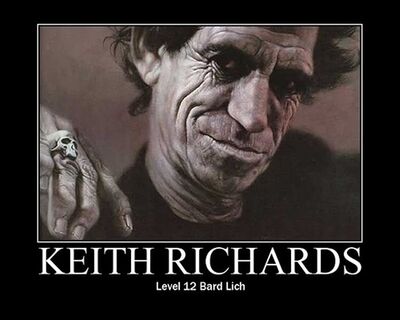Lich

Liches (from Leiche, German for "corpse") are necromancers who have managed to master their art and straddle the line between life and death. After decades of research, practice, and gathering of materials, a lich-to-be performs a ceremony that extracts the soul from his or her body and places it in a phylactery, usually an ornament of value to the lich. After that, if the lich's body is ever destroyed, it will reform at the phylactery, so long as the phylactery remains intact. This makes them a nice persistent foe for a DM to throw at at a party. Other benefits of lichdom include the ability to live without eating or sleeping, giving the lich that much more time to get things done.
The ceremonies for becoming a lich (and most forms of necromancy, for that matter) tend to involve sacrificing of souls and killing of innocents, so liches are generally of evil alignment, but a person who neither eats nor sleeps and reforms after being destroyed can certainly do a lot of good; depending on the setting, it may be possible to become a lich without doing anything irredeemably evil (or even mean-spirited).
Back in 2e D&D, liches came in multiple types depending on what kind of magic was used to create them. Your common lich was a former wizard, with seperate stats in other splats for clerical, bardic and psionic liches.
Lich Variants
- Archlich
- A lich who took longer to become a lich, but isn't evil in the trade-off. Introduced in Spelljammer, with later settings and editions providing rules to let players become one, including an Epic Destiny in 4e.
- Balenorn
- A good-aligned elf lich, created willingly from an elf who wants to be undead only to guard something very important or who wants to stick around beyond death to keep watch over their family.
- Demi-Lich
- A lich who derped around for so long that his body is just a flying bit of skeleton (usually a skull) full of soul gems. Despite their small size, they're much nastier than a normal lich; their spellcasting is even stronger, they have oodles of opportunities to cast Soul Trap and bone you, and they like to fly juuuust out of players' easy reach. They are also immune to most spells and magical effects, except for a few holy-powered ones and one derpy second-level spell called shatter that screws them something fierce by blowing out their soul gems.
See Also
- Drew the Lich, a Quest where /tg/ played a lich.
- The Millennial King, a story and setting inspired by /tg/ speculating on what a good necromancer would be like. To make a long story short: he becomes a lich and leads his kingdom to an era of prosperity with a skeleton-powered industrial revolution.
- Deep Rot, a skeletal supercomputer constructed by a mad lich.